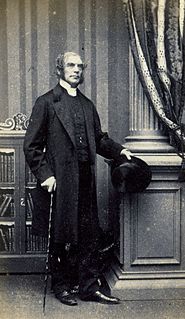Top 747 Righteousness Quotes & Sayings - Page 12
Explore popular Righteousness quotes.
Last updated on December 25, 2024.
By the cross we, too, are crucified with Christ; but alive in Christ. We are no more rebels, but servants; no more servants, but sons! "Let it be counted folly," says Hooker, "or fury, or frenzy, or whatever else; it is our wisdom and our comfort. We care for no knowledge in the world but this, that man hath sinned, and that God hath suffered; that God has made Himself the Son of Man, and that men are made the righteousness of God."
Love of peace is common among weak, short-sighted, timid, and lazy persons; and on the other hand courage is found among many men of evil temper and bad character. Neither quality shall by itself avail. Justice among the nations of mankind, and the uplifting of humanity, can be brought about only by those strong and daring men who with wisdom love peace, but who love righteousness more than peace.
It is not the being seen of men that is wrong, but doing these things for the purpose of being seen of men. The problem with the hypocrite is his motivation. He does not want to be holy; he only wants to seem to be holy. He is more concerned with his reputation for righteousness than about actually becoming righteous. The approbation of men matters more to him than the approval of God.
The whole life of Christians ought to be an exercise of piety, since they are called to sanctification. It is the office of the law to remind them of their duty and thereby to excite them to the pursuit of holiness and integrity. But when their consciences are solicitous how God may be propitiated, what answer they shall make, and on what they shall rest their confidence, if called to his tribunal, there must then be no consideration of the requisitions of the law, but Christ alone must be proposed for righteousness, who exceeds all the perfection of the law.
Observance of customs and laws can very easily be a cloak for a lie so subtle that our fellow human beings are unable to detect it. It may help us to escape all criticism, we may even be able to deceive ourselves in the belief of our obvious righteousness. But deep down, below the surface of the average man's conscience, he hears a voice whispering, 'There is something not right,' no matter how much his rightness is supported by public opinion or by the moral code.
Was not Jesus an extremist for love: "Love your enemies, bless them that curse you, do good to them that hate you, and pray for them which despitefully use you, and persecute you." Was not Amos an extremist for justice: "Let justice roll down like waters and righteousness like an ever-flowing stream." Was not Paul an extremist for the Christian gospel: "I bear in my body the marks of the Lord Jesus."
Our too-young and too-new America, lusty because it is lonely, aggressive because it is afraid, insists upon seeing the world in terms of good and bad, the holy and the evil, the high and the low, the white and the black; our America is frightened of fact, of history, of processes, of necessity. It hugs the easy way of damning those whom it cannot understand, of excluding those who look different, and it salves its conscience with a self-draped cloak of righteousness
Daily simple, sincere, and mighty prayers lift our lives to a higher spiritual altitude. In our prayers we praise God, give thanks to Him, confess weaknesses, petition needs, and express deep devotion to our Heavenly Father. As we make this spiritual effort in the name of Jesus Christ, the Redeemer, we are endowed with increased inspiration, revelation, and righteousness, which bring the brightness of heaven into our lives.
What one thing does the world need most today-apart, that is, from the all-inclusive thing we call righteousness? Aren't you inclined to agree that what this old world needs is just the art of being kind? Every time I visit a factory or any other large business concern, I find myself trying to diagnose whether the atmosphere is one of kindliness or the reverse. And somehow, if there is palpably lacking that spirit of kindness, the owners ... have fallen short of achieving 24-carat success no matter how imposing the financial balance sheet may be.
If the impure and the unjust, the drunkard and the licentious, are loathsome to us, what must be the infinite loathing of an infinitely pure Spirit for those who are worldly and selfish, licentious and cruel, ambitious and animal! But with this great loathing is a great pity. And the pity conquers the loathing, appeases it, satisfies it, is reconciled with it, only as it redeems the sinner from his loathsomeness, lifts him up from his degradation, brings him to truth and purity, to love and righteousness; for only thus is he or can he be brought to God.
problematic within post-Reformation dogmatics. Is faith something I `do' to earn God's favour, and, if not, what role does it play? Once we release Paul's justification-language from the burden of having to describe `how someone becomes a Christian', however, this is simply no longer a problem. There is no danger of imagining that Christian faith is after all a surrogate `work', let alone a substitute form of moral righteousness. Faith is the badge of covenant membership, not something someone `performs' as a kind of initiation test.
Let it stand, therefore, as an indubitable truth, which no engines can shake, that the mind of man is so entirely alienated from the righteousness of God that he cannot conceive, desire, or design any thing but what is wicked, distorted, foul, impure, and iniquitous; that his heart is so thoroughly envenomed by sin that it can breathe out nothing but corruption and rottenness; that if some men occasionally make a show of goodness, their mind is ever interwoven with hypocrisy and deceit, their soul inwardly bound with the fetters of wickedness.
Whatever God felt about anything, He still feels. Whatever He thought about anyone, He still thinks. Whatever He approved, He still approves. Whatever He condemned, He still condemns. Today we have what they call the relativity of morals. But remember this God never changes. Holiness and righteousness are conformity to the will of God. And the will of God never changes for moral creatures.
A person who suffers bitterly when slighted or insulted should recognize from this that he still harbors the ancient serpent in his breast. If he quietly endures the insult or responds with great humility, he weakens the serpent and lessens its hold. But if he replies acrimoniously or brazenly, he gives it strength to pour its venom into his heart and to feed mercilessly on his guts. In this way the serpent becomes increasingly powerful; it destroys his soul's strength and his attempts to set himself right, compelling him to live for sin and to be completely dead to righteousness.
The love of God again makes us free, for it draws us to set a low value on those things wherein we are subject to others - our wealth, our position, our reputation, and our life - and to set a high value on those things which no man can take from us - our integrity, our righteousness, our love for all men, and our communion with God.
Your wickedness makes you as it were heavy as lead, and to tend downwards with great weight and pressure towards hell; and if God should let you go, you would immediately sink and switfly
descend and plunge into the bottomless gulf, and your healthy constitution, and your own care and prudence, and best contrivance, and all your righteousness, would have no more influence to
uphold you and keep you out of hell, than a spider's web would have to stop a fallen rock.
When a teacher of the future comes to point out to the youth of America how the highest rewards of intellect and devotion can be gained, he may say to them, not by subtlety and intrigue; not by wire pulling and demagoguery; not by the arts of popularity; not by skill and shiftiness in following expediency; but by being firm in devotion to the principles of manhood and the application of morals and the courage of righteousness in the public life of our country; by being a man without guile and without fear, without selfishness, and with devotion to duty, devotion to his country.
If Christ be a fraud, he was among the most peculiar yet brilliant of frauds in saying that only he was the way, the truth, and the life. This is the importance of grace - some people think that simply being nice and not harming others is morality; others think that following rules and tithing are morality. But without Christ, all moral beliefs ultimately boil down to the one sin which perpetually rails against the concept of grace: man's lawful, religious, and futile attempt at establishing his own righteousness.
Only when we see that the way of God's law is absolutely inflexible will we see that God's grace is absolutely indispensable. A high view of the law reminds us that God accepts us on the basis of Christ's perfection, not our progress. Grace, properly understood, is the movement of a holy God toward an unholy people. He doesn't cheapen the law or ease its requirements. He fulfills them in his Son, who then gives his righteousness to us. That's the gospel. Pure and simple.
Godliness has 'promise of the life that now is, and of that which is to come.' But the only way one can enter into godliness is by turning to God as a repentant sinner and receiving the Saviour He has provided in the Gospel. Therefore the crying need of our degenerate times is for a revival of true old-fashioned, Christ- centered, Bible preaching that will call upon all men everywhere to repent in view of that coming day when God will judge the world in righteousness by His Risen Son.
Not simply the righteousness of our Saviour, not simply the beauty of His holiness or the graces of His character, are we to put on as a garment. The Lord Himself is our vesture. Every Christian is not only a Christ bearer, but a Christ wearer. We are so to enter into Him by communion, to be so endued with His presence, and imbued with His Spirit that men shall see Him when they behold us, as they see our garments when they look upon our bodies.
I have met many, many farm workers and friends who love justice and who are willing to sacrifice for what is right. They have a quality about them that reminds me of the beatitudes. They are living examples that Jesus' promise is true: they have ben hungry and thirsty for righteousness and they have been satisfied. They are determined, patient people who believe in life and who give strength to others. They have given me more love and hope and strength than they will ever know.
God's word tells us that righteousness is a gift; it cannot be earned. But godliness is not a gift. We must pay a price to touch godliness through a daily decision to die to self and embrace the cross. God calls us to learn godliness in the classroom of life among people as we sit on airplanes and buses, walk among our neighbors and labor at our factories or desks.
Christians often equate holiness with activism and spiritual disciplines. And while it's true that activism is often the outgrowth of holiness and spiritual disciplines are necessary for the cultivation of holiness, the pattern of piety in the Scripture is more explicitly about our character. We put off sin and put on righteousness. We put to death the deeds of the flesh and put on Christ. To use the older language, we pursue mortification of the old man and the vivification of the new.
The constant exercise of our faith by lofty thinking, prayer, devotion, and acts of righteousness is just as essential to spiritual health as physical exercise is to the health of the body. Like all priceless things, faith, if lost, is hard to regain. Eternal vigilance is the price of our faith. In order to retain our faith we must keep ourselves in tune with our Heavenly Father by living in accordance with the principles and ordinances of the gospel.
It has been said that God's gift is also indescribable because of the grace by which it is given. God, who is rich in mercy, gave the world the gift of His dear Son while we were at enmity with Him. Paul says: 'But God commendeth His love toward us, in that, while we were yet sinners, Christ died for us' (Rom. 5:8). Therefore, in Him we are freely given all things: redemption, forgiveness of sins, righteousness, peace, hope, wisdom and knowledge.
America's Christian conservative movement is confronted with this divide: small-government advocates who want to practice their faith independent of heavy-handed government versus big-government sympathizers who want to impose their version of 'righteousness' on others through the hammer of law.... Our movement must avoid the temptations of power and those who would twist the good intentions of Christian voters to support policies that undermine freedom and grow government.
It is then, we say, in the successive stages of his experience, that the believer sees more distinctly, and adores more profoundly, and grasps more firmly, the finished righteousness of Christ. And what is the school in which he learns his nothingness, his poverty, his utter destitution? The school of deep and sanctified affliction. In no other school is it learned, and under no other teacher but God. Here his high thoughts are brought low, and the Lord alone is exalted.
I know that every difficulty we face in life, even those that come from our own negligence or even transgression, can be turned by the Lord into growth experiences, a virtual ladder upward. I certainly do not recommend transgression as a path to growth. It is painful, difficult, and so totally unnecessary. It is far wiser and so much easier to move forward in righteousness. But through proper repentance, faith in the Lord Jesus Christ, and obedience to His commandments, even the disappointment that comes from transgression can be converted into a return to happiness.
If Christ has been given us, if we are called to his discipleship we are given all things, literally _all_ things. He will see to it that they are added unto us. If we follow Jesus and look only to His righteousness, we are in his hands and under the protection of Him and His Father. And if we are in communion with the Father, nought can harm us. God will help us in the hour of need, and He knows our needs.
The man who enters combat encased in solid armor plate, but lacking the essential of selfconfidence, is far more exposed and naked to death than the individual who subjects himself to battle shorn of any protection but his own skill, his own belief in himself and in his wingman. Righteousness is necessary for one's peace of mind, perhaps, but it is a poor substitute for agility . . . and a resolution to meet the enemy under any conditions and against any odds.
So go marry someone, provided you're equally yoked and you actually like being with each other. Go get a job, provided it's not wicked. Go live somewhere in something with somebody or nobody. But put aside the passivity and the quest for complete fulfillment and the perfectionism and the preoccupation with the future, and for God's sake start making some decisions in your life. Don't wait for the liver-shiver. If you are seeking first the kingdom of God and His righteousness, you will be in God's will, so just go out and do something.
We Gentiles owe our life to Israel. It is Israel who has brought us the message that God is one, and that God is a just and righteous God, and demands righteousness of his children, and demands nothing else. It is Israel who has brought us the message that God is our Father. It is Israel who, in bringing us the divine law, has laid the foundation of liberty.
There is nothing in either savage or civilized history that is more utterly complete, more remorselessly sweeping than the Father of Mercy´s campaign among the Midianites. The official report deals only in masses, all the virgins, all the men, all the babies. all ´creatures that breathe,´ all houses. all cities. It gives you just one vast picture ...as far as the eye can reach, of charred ruins and storm-swept desolation... Would you expect this same conscienceless God, this moral bankrupt, to become a teacher of morals, of gentleness, of meekness, of righteousness, of purity?
When we think of the height of God's infinity we should not despair of His compassion reaching us from such a height; and when we recall the infinite depth of our fall through sin we should not refuse to believe that the virtue which has been killed in us will rise again. For God can accomplish both these things: He can come down and illumine our intellect with spiritual knowledge, and He can raise up the virtue within us and exalt it with Himself through works of righteousness.
In the Confucian tradition is a simple formula that appeals to me deeply: 'If there is righteousness in the heart, there will be beauty in the character. If there is beauty in the character, there will be harmony in the home. If there is harmony in the home, there will be order in the nation. If there is order in the nation, there will be peace in the world.' I urge everyone to reflect deeply on these words, as simple as they are profound.
If we suppose a sufficient righteousness and intelligence in men to produce presently, from the tremendous lessons of history, an effective will for a world peace - that is to say, an effective will for a world law under a world government - for in no other fashion is a secure world peace conceivable - in what manner may we expect things to move towards this end? . . . It is an educational task, and its very essence is to bring to the minds of all men everywhere, as a necessary basis for world cooperation, a new telling and interpretation, a common interpretation, of history.
Ambitions for self may be quite modest. . . . Ambitions for God, however, if they are to be worthy, can never be modest. There is something inherently inappropriate about cherishing small ambitions for God. How can we ever be content that he should acquire just a little more honour in the world? No. Once we are clear that God is King, then we long to see him crowned with glory and honour, and accorded his true place, which is the supreme place. We become ambitious for the spread of his kingdom and righteousness everywhere.
Here is my challenge. Name one ethical statement made, or one ethical action performed, by a believer that could not have been uttered or done by a nonbeliever. And here is my second challenge. Can any reader think of a wicked statement made, or an evil action performed, precisely because of religious faith? The second question is easy to answer, is it not? The first - I have been asking it for some time - awaits a convincing reply. By what right, then, do the faithful assume this irritating mantle of righteousness? They have as much to apologize for as to explain.
Though a man may be found in a weak state, that does not at all mean that he has been abandoned by God. On the cross, the Lord Jesus Christ was in trouble, as the world sees things. But when the sinful world considered Him to be completely destroyed, in fact He was victorious over death and hades. The Lord did not promise us positions as victors as a reward for righteousness, but told us, "In the world you will have tribulation - but be of good cheer, for I have overcome the world".
Some relate . . . that the eagle tries the eyes of her young by turning them to the sun; which if they cannot look steadily on, she rejects them as spurious. We may truly try our faith by immediate intuitions of the Sun of Righteousness. Direct faith to act itself, immediately and directly on the incarnation of Christ and His mediation; and if it be not the right kind and race, it will turn its eyes aside to anything else.
I have one great political idea... That idea is an old one. It is widely and generally assented to; nevertheless, it is very generally trampled upon and disregarded. The best expression of it, I have found in the Bible. It is in substance, "Righteousness exalteth a nation - sin is a reproach to any people." This constitutes my politics, the negative and positive of my politics, and the whole of my politics... I feel it my duty to do all in my power to infuse this idea into the public mind, that it may speedily be recognized and practiced upon by our people.
Today, whether it is a student who holds a sit-in to get the army recruiters off his campus, or the mother of a dead soldier who refuses to leave the front gate of the president's ranch, we continue to be saved by brave people who risk ridicule and rejection but end up turning huge tides of public opinion in the direction of righteousness. We owe them enormous debts of gratitude. It is not easy to stand up for what is right, especially when everyone else is afraid to leave the comfortable path of conformity.
In a world threatened by a famine of righteousness and spiritual starvation, we have been commanded to sustain the prophet. As we give heed to, uphold, and affirm prophetic word, we witness that we have the faith to humbly submit to the will, the wisdom, and the timing of the Lord. We heed prophetic word even when it may seem unreasonable, inconvenient, and uncomfortable. According to the world’s standards, following the prophet may be unpopular, politically incorrect, or socially unacceptable. But following the prophet is always right.
Each day the forces of evil and the forces of good enlist new recruits. Each day we personally make many decisions showing the cause we support. The final outcome is certain---the forces of righteousness will win. But what remains to be seen is where each of us personally, now and in the future, will stand in this battle---and how tall we will stand. Will we be true to our last days and fulfill our foreordained missions?
If this being is omnipotent, then every occurrence, including every human action, every human thought, and every human feeling and aspiration is also His work; how is it possible to think of holding men responsible for their deeds and thoughts before such an almighty Being? In giving out punishment and rewards He would to a certain extent be passing judgment on Himself. How can this be combined with the goodness and righteousness ascribed to Him?
In Christ alone God’s rich provision of salvation for sinners is treasured up: by Christ alone God’s abundant mercies come down from heaven to earth. Christ’s blood alone can cleanse us; Christ’s righteousness alone can cleanse us; Christ’s merit alone can give us a title to heaven. Jews and Gentiles, learned and unlearned, kings and poor men--all alike must either be saved by the Lord Jesus, or lost forever.
Women should be women and not babies that need petting and correction all the time. I know we like to be appreciated but if we do not get all the appreciation which we think is our due, what matters? We know the Lord has laid high responsibility upon us, and there is not a wish or desire that the Lord has implanted in our hearts in righteousness but will be realized, and the greatest good we can do to ourselves and each other is to refine and cultivate ourselves in everything that is good and ennobling to qualify us for those responsibilities.
More than we care about their "success," vocation, or financial status, our hearts will be encouraged when our kids are faithful followers of Christ, and our hearts will be distressed when our kids appear to reject the Christian faith. So, the most important thing is transferring our kids' allegiance from us to Christ, raising faithful disciples who seek first the kingdom of God and his righteousness.
Kindness is not like a barter, so much for so much; or so much by contract, and my duty done. But kindness is like a righteousness or like a worship, not done unless it be done all I can. For the heart must run forth without measure like a child, and kindness be wound around like a child's arms about the neck, not by measure, but as tightly and as long as they can be.
I can honestly say that there are many forms of atheism that I find far more admirable than many forms of Christianity or of religion in general. But atheism that consists entirely in vacuous arguments afloat on oceans of historical ignorance, made turbulent by storms of strident self-righteousness, is as contemptible as any other form of dreary fundamentalism. And it is sometimes difficult, frankly, to be perfectly generous in one’s response to the sort of invective currently fashionable among the devoutly undevout, or to the sort of historical misrepresentations it typically involves.
When the devil looks at a man who sincerely desires not to sin, he is not so unintelligent as to suggest to him (as he would to a hardened sinner) that he go and commit fornication or go and steal. He knows we do not want that and he does not set out to tell us something we do not want to hear; but he finds out that little bit of self-will or self-righteousness and through that, with the appearance of well doing, he will do us harm.
We must believe in Christ and pattern our lives after him. We must be baptized as he was baptized. We must worship the Father as he did. We must do the will of the Father as he did. We must seek to do good and work righteousness as he did. He is our Exemplar, the great Prototype of salvation. . . . we must so live as to acquire the attributes of godliness and become the kind of people who can enjoy the glory and wonders of the celestial kingdom.
Whoever imposes severe punishment becomes repulsive to the people; while he who awards mild punishment becomes contemptible. But whoever imposes punishment as deserved becomes respectable. For punishment when awarded with due consideration, makes the people devoted to righteousness and to works productive of wealth and enjoyment; while punishment, when ill-awarded under the influence of greed and anger or owing to ignorance, excites fury even among hermits and ascetics dwelling in forests, not to speak of householders.
Many Christians still at bottom look upon God as one of the most selfish, self-absorbed Beings in the universe, far more selfish than they could think it right to be themselves, -intent only upon His own honor and glory, looking out continually that His own rights are never trampled on; and so absorbed in thoughts of Himself and of His own righteousness, as to have no love or pity to spare for the poor sinners who have offended Him.
Like Muslims we assume that God will judge us "on balance." If our good deeds outweigh our bad deeds, we will arrive safely in heaven. But, alas, if our evil deeds outweigh our good ones, we will suffer the wrath of God in hell. We may be "marred" by sin but in no wise devastated by it. We still have the ability to balance our sins with our own righteousness. This is the most monstrous lie of all.
























































